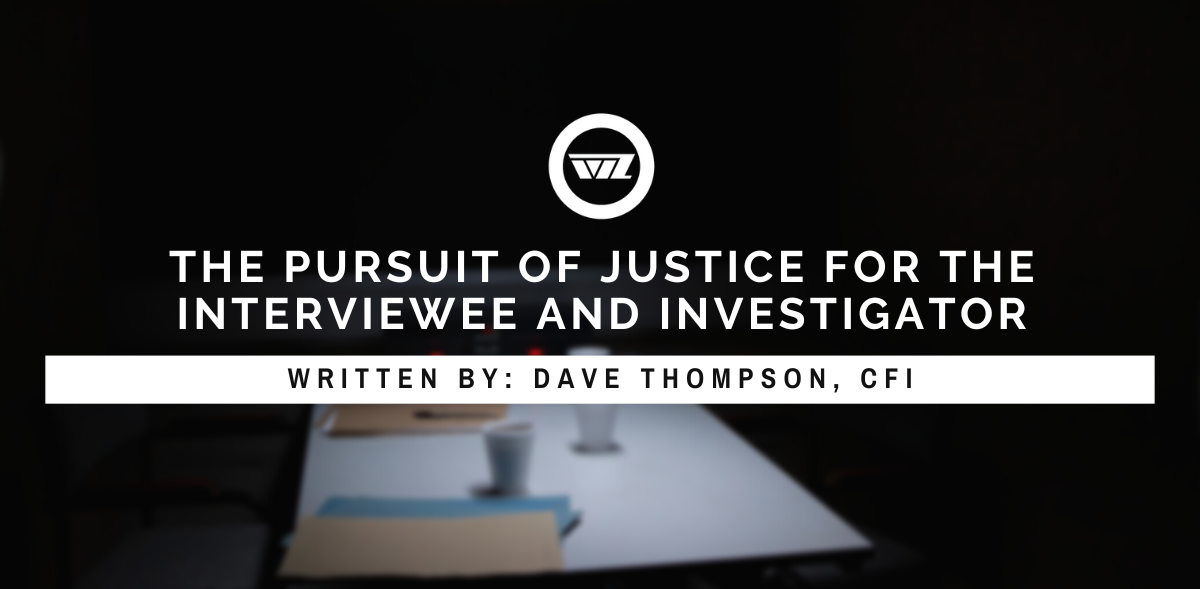Let me be clear.
The primary intention of this article is to serve as a reminder for any and all interview practitioners: before you begin an interview, make sure your mindset is rooted in one simple, unwavering objective.
Identifying the truth.
Over the last few years, there has been an influx of documentaries and mini-series dedicated to the conversation of false confessions. This is a topic I have been passionate about for many years, so naturally, I have been keeping up with each new project as it’s been released. The overwhelming result of this newfound mainstream interest has been positive—shining a long-overdue light on the terribly unfortunate reality that is, the false confession.
It hasn’t been all kittens and unicorns, however. As with any topic, the message can sometimes be lost in translation and biases tend to surface in both the story’s depiction as well as the way it’s interpreted by the viewer. The one thing that is painfully true, regardless of the level of bias that may be infused into the films or brought on from the viewers, is false confessions DO HAPPEN.
In these situations, a common question that arises is, “Why would the interviewer want to arrest someone they aren’t even sure TRULY committed the crime?”
I like to believe (in the majority of cases) that when law enforcement makes the decision to place someone under arrest—they are doing so because they DO believe that person is truly guilty of the underlying offense. It’s how they got to that conclusion that I believe we should examine more closely.
Let’s break it down into three areas of concern: First deals with misclassification—referring to those times when a suspect is misidentified based off an error in eyewitness recollection, questionable forensics, or several other variables that can narrow the scope of the investigation onto the wrong individual. Often this happens when there is a heightened sense of urgency attached to a particular investigation and few leads to work from.
Secondly, the interviewer doesn’t know what they don’t know. Meaning, while law enforcement is often going in with the right intention, the extent of their training may not have touched on the topic of false confessions. If they don’t know what to look for and have only been trained in a very particular methodology of interview techniques, to them—they are just doing their jobs.
Thirdly, once the interviewer is educated on the reality of false confessions, they need to take the time to gut-check their motive throughout the case. This applies not only to the law enforcement personnel, but also to the prosecutors and judges alike. This requires proactive internal dialogue before the conversation, ensuring the interviewer is focused on the truth rather than the confession—a task that becomes increasingly challenging with the introduction of outside variables stemming from the desire to provide closure to the case at hand.
Several prescriptive methods are now being implemented around the globe to continue to gain a better understanding of how false confessions occur as well as to learn what can we do to mitigate them from surfacing in the first place. Extensive research on both fronts has served as the catalyst for the movement we are now seeing unfold around us.
My call to action is something that can be done individually. It doesn’t require your department/agency/organization/company to invest thousands of dollars to send you and your team through an extensive training program. It doesn’t even require a college degree, certificate, or credential of any type.
It’s simply twofold: First, take the time to educate yourself on false confessions and how they occur. Second, remember to recalibrate your motivation before, during and after your interviews. Your mindset needs to be truth-oriented rather than confession-driven.
We talk a lot about preparation in this industry—getting our ducks in a row during the investigation, preparing accordingly so we go into the interview as knowledgeable as possible as well as ensuring our case files and evidence are squared away should the case go to court.
The one piece of preparation that is often overlooked is the mental side—taking time to intentionally orient our mindset to a neutral, truth-oriented state. This requires possessing the baseline knowledge of what can go wrong in the interview, as well as being aware of our own preconceptions. No easy feat.
Often, our judgment and purpose can become clouded by an objective of chasing the biases that we have developed at some point during the process of the investigation or interview. That prejudice may stem from a tip, a hunch, classifying or misclassifying behavior, urgency, fear, judgment, etc. The challenge is recognizing them when they manifest and recalibrating before moving forward.
This takes a conscious, proactive effort—one that can only come with a purposeful sense of self-awareness.
The reality of this issue is that no one is immune to getting wrapped up in the case and having their judgment skewed. Go back and read through the disturbingly large number of KNOWN cases in which false confessions were a factor. You will see that some of the most talented and respected detectives, agents, prosecutors and judges have been blinded by their own and by others’ biases.
I am only asking that we do what we can as individuals. We can educate ourselves and make an active effort to be conscious of what biases we are bringing to the table.
We can only make a difference if we are aware that a difference needs to be made in the first place. Knowledge is the first hurdle, awareness and deliberate action are the finish line.
The first step is up to you.
Tony Paixão, CFE, CFI, is a Certified Forensic Interviewer, speaker and consultant for Wicklander-Zulawski & Associates, Inc. (WZ). Tony has served in a variety of roles both in the public and private sectors. He is also an active member of the International Association of Interviewers (IAI). Tony has conducted investigations and interrogations for hundreds of cases ranging from retail fraud to homicide to sexual assault and employee relations matters.




